Long-Term Stays
Interested in spending a longer period of time here at the ashram? We're always open to enquiries from potential new members of our small resident team.
If you haven't been before, have a read through the various sections below describing ashram life and then book in for an initial visit to meet the team.
Conscious Living
An extended time in the Ashram, from one month to a year or more, can be a priceless opportunity to come to know oneself; to stop hiding from ourselves, to stop becoming lost in distractions and inconsequential activities, and to open up to who we authentically are.
An extended stay is for those who can find some time in their life in which they are relatively free from work and family commitments, and who sincerely aspire to follow the path of self-development, selfless service and inner transformation through yoga and the spiritual path.
Such a stay may not always be overly comfortable, because we start to see the idiosyncrasies of our mind; those aspects of our personality which prevent us from being happy. Ashram life can often be challenging as we come face to face with ourselves, and are encouraged to break through self-limiting concepts of who we are and what we are capable of. Such challenges provide the fuel for authentic awakening, supported and guided by senior practitioners.
An extended Ashram stay will certainly make us stronger and more able to face the challenges of life, both inside and outside the Ashram. Firstly, we start to consciously face the quirks of our personality. Secondly, we are empowered to become more fully alive to life in the moment, able to face and adapt to life with greater self-belief and inner resources. Thirdly, the Ashram and the practice of yoga catalyses a new way of being so that we start to live more and more consciously, rather than live bound by the habitual patterns of mind and body.
Life in the Ashram offers you the chance to live and practice for a period of time within a small group of like-minded people, in a simple natural environment that is rooted in core spiritual values and teachings. Whilst living, or staying, in the Ashram you will take part in a structured daily timetable for six days each week, including morning chanting and meditation and five hours each day of karma yoga. There is usually one day off each week.

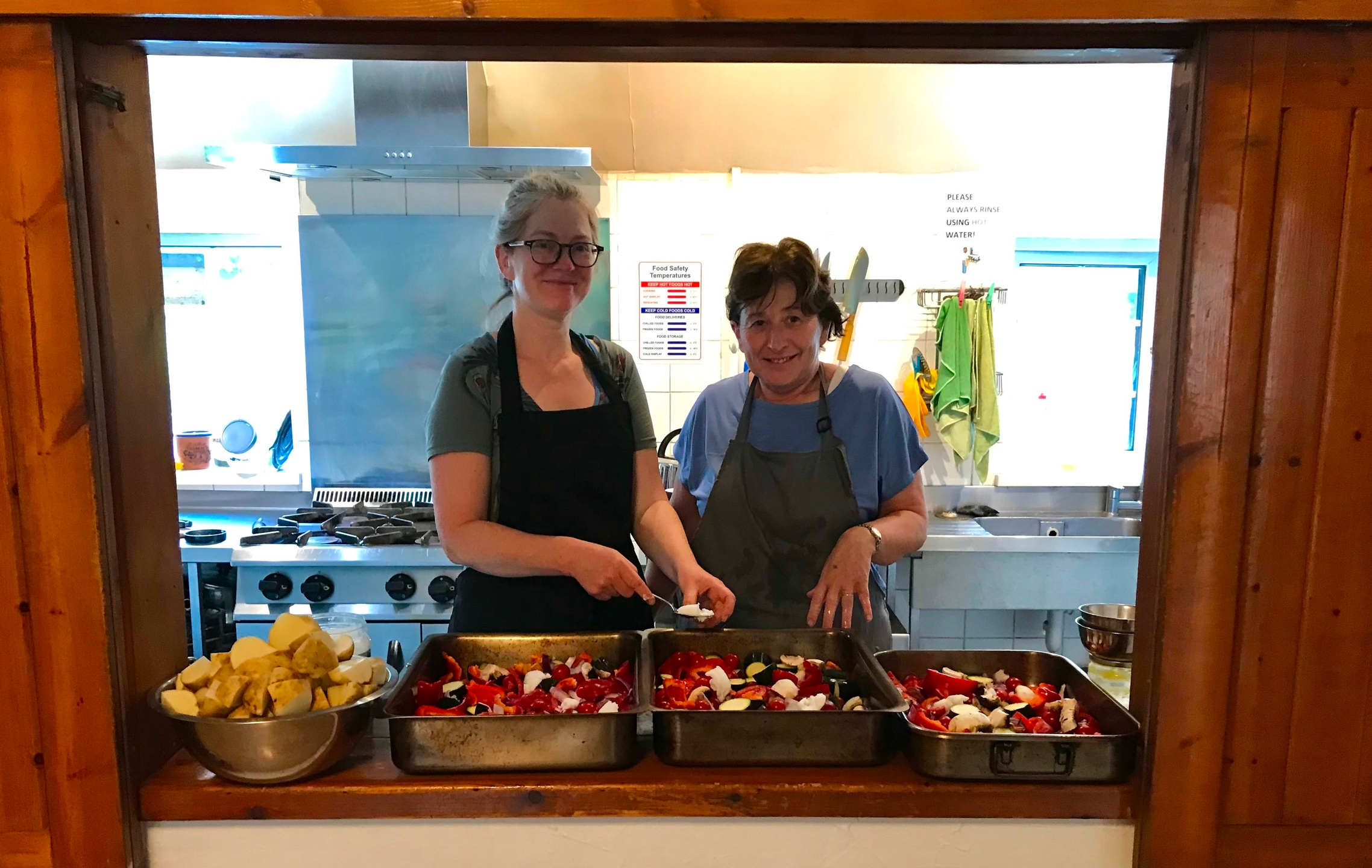
Karma Yoga
An invaluable part of ashram life is the practice of karma yoga, which is doing work with the attitude of service (seva) and with Awareness. It is an essential aspect of yoga but we tend to think that work has nothing to do with yoga and don't realise that it could be transformative.
On a mundane level, it is work around the ashram, such as gardening, cooking, housework, maintaining our buildings - whatever needs doing at a particular time. On a deeper level, karma yoga implies that we are fully engaged in doing the work in hand whilst simultaneously being in touch with our inner being.
Work is not regarded as a chore, but rather as a tool to increase sensitivity and Awareness. By working with Awareness we are focused on our actions in the present moment. We are able to observe, and then deal with, the inner patterns and insecurities that plague our minds. It also develops a conscious interaction with life situations, improving our concentration, steadfastness and intuition. As a result, the quality of our practice of meditation is enhanced and we are enabled to go deeper.
The ideal of karma yoga is to be totally in the here and now, to do what is appropriate under a given set of circumstances, to the best of our ability. There is no expectation of any reward, gratitude or recognition, and we are not overly concerned with the outcome.
For further information see Swami Nishchalananda's booklet 'Karma yoga - the yoga of awareness in action', available from the Ashram Shop.
Mouna
Mouna is a period of silence where we continue our yoga practice and daily lives without speaking. It is a key part of ashram life.
At the ashram we practice mouna every day from 9pm until breakfast the following morning, for the first half of lunch and supper and for longer periods during some of our courses and residents retreats.
Through the medium of speech, our awareness is directed outwards to the external world. This is fine when interacting with the world around us, but just as important in the ashram is interacting with the world within us. The practice of mouna prompts the mind to go inward and to get in touch with our thoughts, emotions, desires and ambitions on a deeper level. Mouna also helps us conserve energy which is normally dissipated through speech. This energy can then be used for other spiritual practices. With continued practice, mouna helps us to sharpen our perceptions and awareness, and bring a sense of stillness to the mind and emotions.
It can be strange at first not to speak but many people enjoy the solitude and also the companionship of others on a spiritual path without the need to talk or listen. We discover we can communicate on another level. It creates a peaceful environment from which an inner stillness can grow, allowing our yoga practice to extend into our daily lives and to touch something deeper within us.

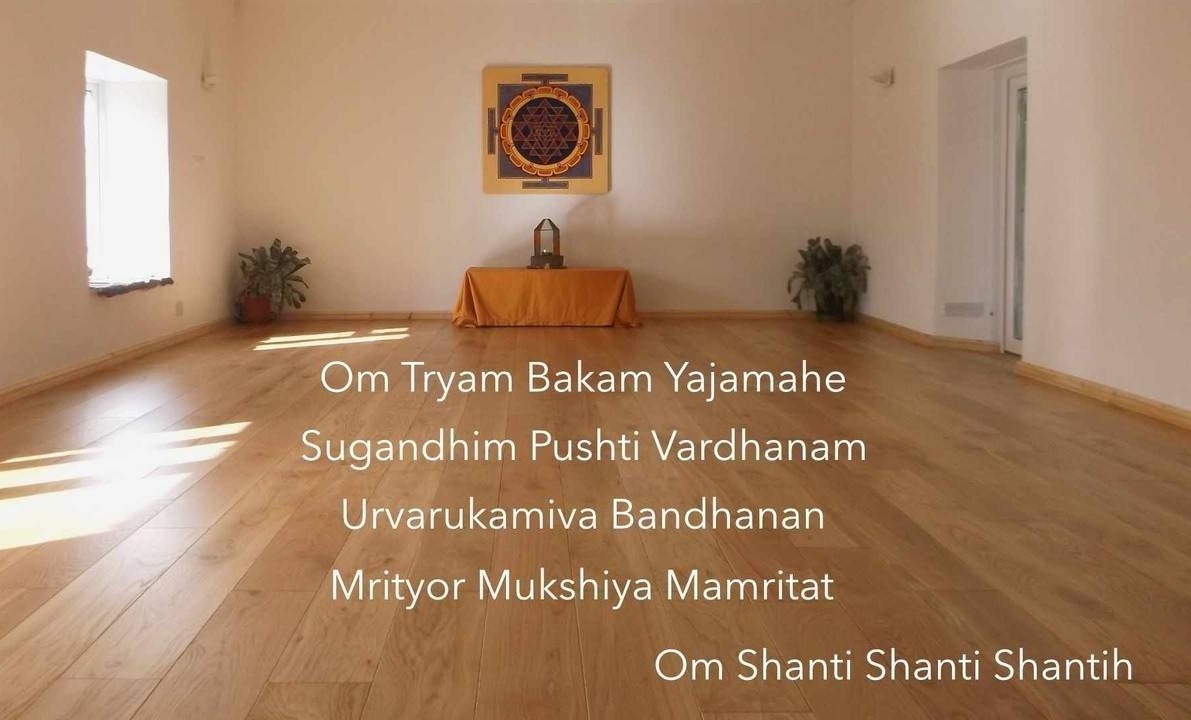
Mahamrityunjaya Mantra
Every Tuesday evening we gather in the Sadhana hall to chant the powerful Mahamrityunjaya Mantra 108 times for the wellbeing and welfare of anyone around the world who is experiencing suffering in any form. This is a beautiful tradition that has been upheld in the Ashram for decades, providing an opportunity for us to share the positive spiritual energy of the Ashram with the world, through the subtle power of our intention and the powerful prism of the Mahamrityunjaya Mantra.
Havan
A havan is a Vedic fire ceremony, a time honoured practice in which the archetype of fire is invoked and nourished with mantra and herbs. The fire is a focal point used to empower certain intentions, or release unnecessary psychological patterns. Furthermore the ambience created by the havan is felt to subtly bless not only the participants but also the surrounding energies and beings of nature. Havans are not a core part of life at the Ashram, happening only once or twice each month, but can be a powerful and beautiful ceremony to engage with.
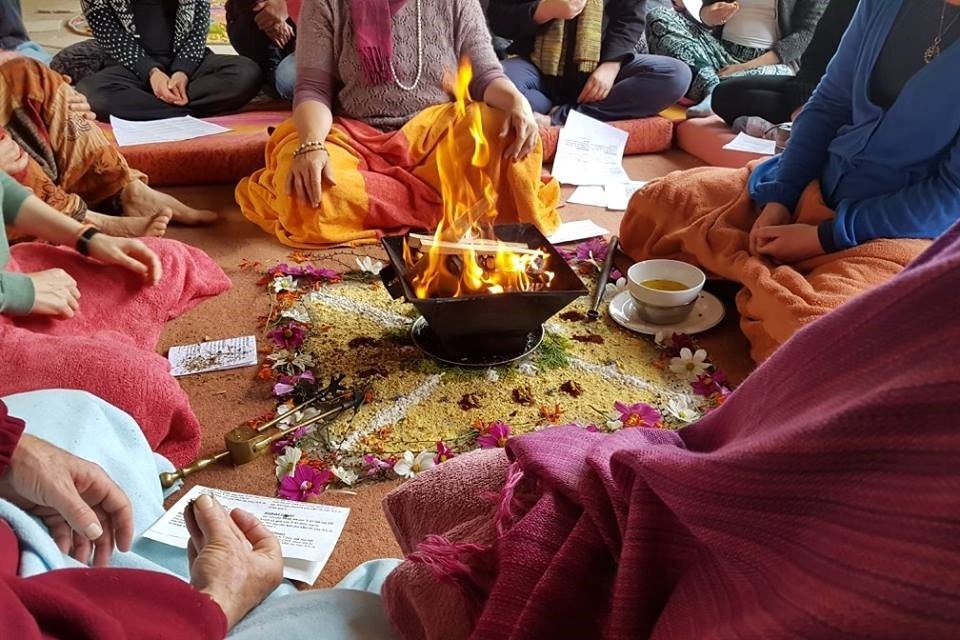
Our Daily Timetable
Everyone staying at the Ashram is expected to follow our daily schedule, which is very simple and designed to enable us to practice the attitudes and spirit of yoga throughout the day.
Below is the standard daily schedule when there is no yoga course taking place. During courses the schedule will adapt slightly according to the course timetable.
- Each day starts early in the morning with personal Yoga practice, or a guided class
- At 7.30 am everybody comes together for Mantra Yoga (chanting) and Meditation. This is followed by 30 minutes of silent cleaning
- Breakfast is at 8.45am
- Karma Yoga through the morning from 9.30am to 1.00pm, pausing for a cup of tea and perhaps a chat at 11am
- Lunch is at 1pm
- After lunch until 4.00pm there is a period for resting, walking in the beautiful natural surroundings of the Ashram, study, interaction and stillness
- Karma Yoga continues from 4.00-6.00 pm
- Supper is at 6.15pm. You may also be involved in washing up after one of the meals during the day
Our Residential Retreats & Online Courses
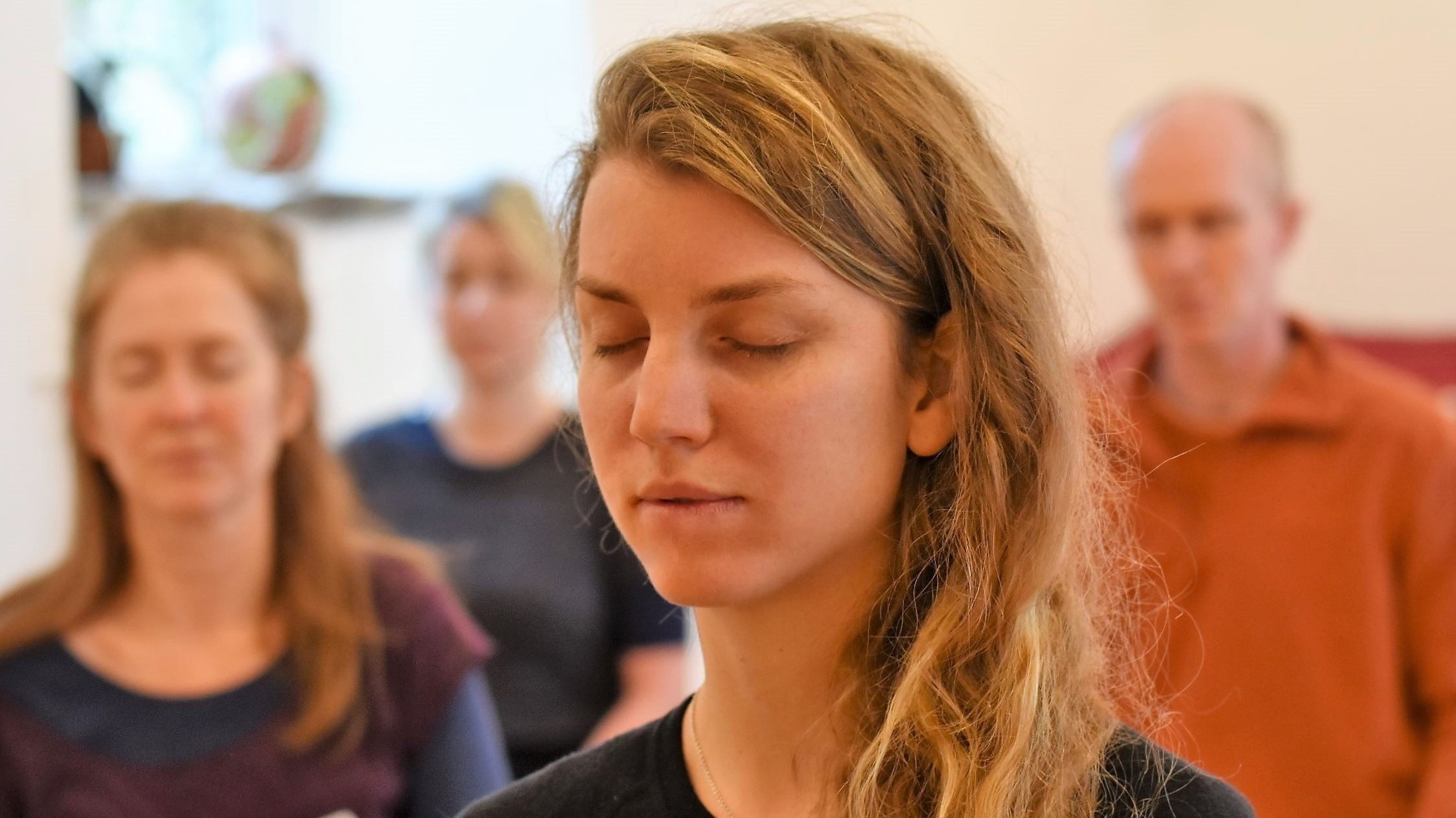
Residential Retreats
Our residential retreats offer high-quality teachings with an emphasis on the cultivation of direct insight, a supportive group field, and opportunity to spend time in the energised sanctuary of the Ashram.

Online Courses
We offer two kinds of online course: live courses broadcast via Zoom, and self-study courses provided through our own online portal. Both are excellent ways to access our teachings from anywhere in the world.
Free Yoga Teachings
In addition to our retreats and courses we offer an extensive free library of high-quality teachings. The library contains a wealth of articles, videos and audios on the philosophy and practice of yoga, advaita and tantra. We believe that genuine spiritual teachings exist for the benefit of everyone, and that money shouldn't be an obstacle to anyone accessing these teachings.
Explore the library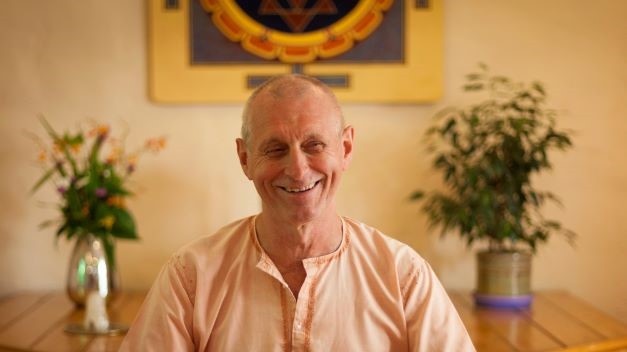
Online Satsang
Join Swami Nishchalananda on Zoom for one-hour satsang sessions. These free sessions usually take place twice per month. Register below to receive invites.
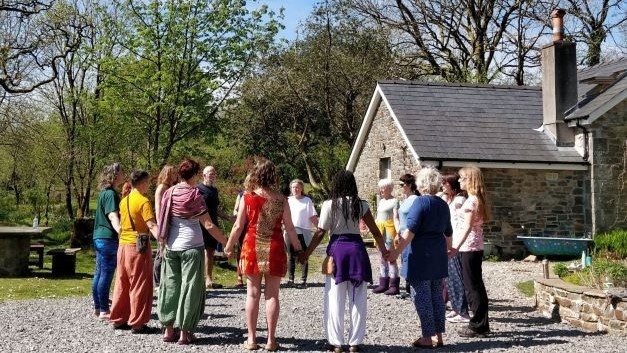
Ashram Sangha
The Ashram Sangha is our new online hub, a space for us to support all those who feel a connection with the Ashram, its teachings, and its vibrant yoga community.

Ashram Shop
In our online shop you can find books and yoga booklets written by Swami Nishchalananda, as well as beautiful malas strung here at the Ashram.


